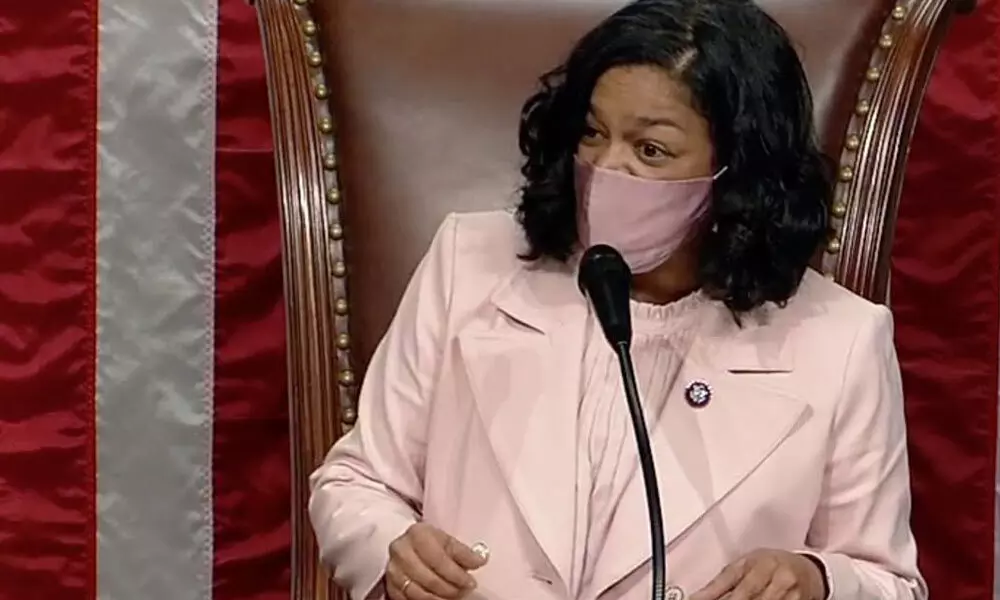Jayapal emerges powerful leader forcing Biden leftward
The Indian-American heads the leftist Congressional Progressive Caucus (CPC), a group of 95 within the 220 Democratic Party in the House of Representatives where the party has a slim edge of only eight over the Republicans giving her a potential veto
image for illustrative purpose

New York: Pramila Jayapal, the Indian-American leader of the progressive faction of the Democratic Party, has emerged as a powerful force in US politics pushing President Joe Biden leftward after holding his signature multi-trillion-dollar programmes hostage.
In Congress, where the Democratic Party holds a slim majority, she shot down a plan carefully crafted by Speaker Nancy Pelosi to get moderates' support by sequentially getting voted in the House of Representatives Biden's $1 trillion plan for the nation's infrastructure and then another plan for over $2 trillion for wide-ranging social and climate change programmes.
Jayapal heads the leftist Congressional Progressive Caucus (CPC), a group of 95 within the 220 Democratic Party in the House of Representatives where the party has a slim edge of only eight over the Republicans giving her a potential veto.
In addition, the CPC has one senator. Biden, who was expected to support Pelosi, instead came to Congress last week and agreed with Jayapal sending the legislations to a limbo where party leaders are now trying to work out a compromise.
The imbroglio arises because of the factionalism in the Democratic Party and the deep suspicions the left and the moderates have for each other.
In August, the Senate had passed the $1 trillion infrastructure programme known as the 'American Jobs Plan (AJP)' which had the support of Democrats and some Republicans, but hasn't taken up the $2 trillion social programme called the 'American Family Plan (AFP)' because of the opposition from the moderates over its cost and the range of programmes from free community college education to care for children and seniors.
The AFP would also raise taxes on the rich, whom Biden said would be those earning over $400,000 per year.
The CPC has refused to back the AJP in the House unless it first passes the AFP because Jayapal and other Caucus leaders fear that the moderates would not back it.
The CPC wants to capitalise on the fact that Biden, Pelosi and many leaders from both sides desperately want to get the AJP passed. It is less controversial and has wide voter support among the voters of both parties because it deals with matters like roads, bridges. public transportation, electric vehicles and internet broadband.
They can't get it unless Jayapal and the CPC get behind it.
"It's not about trusting the speaker, it's not about trusting the president, it's really about the vote as an ironclad assurance from the Senate" that the AFP would be passed, Jayapal said.
Although Biden's spokesperson said on September 30 when Pelosi had set the AJP vote, "we are working towards winning a vote tonight", the House Speaker had to back down and drop it.
At a closed-door meeting with his party members on October 1, Biden switched sides and said that the two plans would have to be taken up together.
He later told reporters that although the AJP vote was off, "it doesn't matter whether it's in six minutes, six days or six weeks. We're going to get it done".
Moderates blamed Jayapal and the CPC for the failure to pass the AJP.
Josh Gottheimer, a Democrat member of the House who worked on finding a compromise, blamed Jayapal and her supporter whom he described as "a small far-left faction" for blocking the "president's historic bipartisan infrastructure bill".
Mid-term elections are scheduled next year covering all members of the House of Representatives and some in the Senate making it imperative for the Democrats to have the programmes in place when they face the voters.

